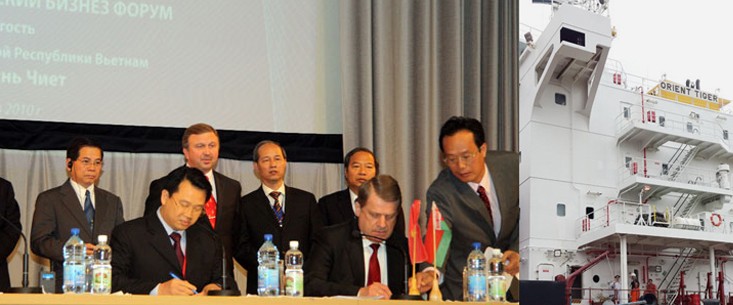Chuỗi cung ứng phân bón toàn cầu cam kết cung cấp các sản phẩm phân bón cho nông dân trên toàn thế giới trong thời điểm khó khăn hiện nay
Tiêu thụ phân bón toàn cầu đạt 193 triệu tấn chất dinh dưỡng trong năm 2017. Ngành phân bón toàn cầu, với doanh thu sản xuất đạt 250 tỷ USD năm 2018 cung cấp gần một triệu việc làm trực tiếp, khoảng 2,2 triệu việc làm gián tiếp trong vận tải và bán lẻ cũng như rất nhiều công việc gián tiếp ở cấp độ trang trại hoặc ở chuỗi cung ứng thực phẩm nông nghiệp.
“Phân bón là một loại thực phẩm cho cây trồng”, Chủ tịch của IFA, ông Mostafa Terrab nhấn mạnh “phân bón góp phần vào việc đảm bảo thực phẩm cho người dân”. Ảnh hưởng của COVID-19 là thách thức lớn, tất cả những người tham gia trong chuỗi giá trị phân bón, từ nhà sản xuất đến thương nhân, nhà phân phối và nhà bán lẻ, đều cần cam kết làm tất cả những gì có thể để đảm bảo cung cấp đủ các sản phẩm dinh dưỡng thực vật (phân bón) và giảm thiểu gián đoạn sự di chuyển tiếp theo của phân bón, trong khi thận trọng để ngăn chặn sự lây lan của vi-rút.
Do các sản phẩm phân bón được giao dịch rộng rãi, với hơn 40% tổng sản lượng được đưa vào thương mại, điều quan trọng đối với các chính phủ trên thế giới là đảm bảo rằng thương mại không bị ảnh hưởng, không gây khó khăn cho sự vận chuyển của phân bón khi mùa trồng trọt đang diễn ra tại nhiều khu vực trên thế giới. Sức khỏe và sự an toàn của người vận chuyển phân bón phải được bảo vệ, vì nguồn lây nhiễm chính của virus là thông qua hệ hô hấp từ người, nhưng điều quan trọng cần phải nhấn mạnh rằng coronavirus không tồn tại sau thời gian ngắn trên bề mặt và không có mối nguy hiểm nào liên quan đến COVID-19 khi nói đến phân bón.
Bà Charlotte Hebebrand, Tổng giám đốc IFA nhấn mạnh cần đảm bảo để phân bón có thể đến với khách hàng trên toàn thế giới .
COVID-19 đưa ra rất nhiều thách thức đối với chính phủ và người dân trên toàn thế giới, điều quan trọng là phải duy trì một hệ thống phân phối và thương mại hài hòa về phân bón nhằm đảm bảo sản xuất nông nghiệp, an ninh lương thực và sinh kế của nông dân trên toàn thế giới.
The Global Fertilizer Supply Chain is committed to delivering plant nutrition products to farmers around the world in these challenging times
Global fertilizer consumption reached 193 million nutrient tons in 2017. The global fertilizer industry, with a global production revenue of $250 billion in 2018, also provides close to a million direct jobs, some 2.2 million indirect jobs in transport and retail, and a great deal more when considering indirect jobs at the farm level or the wider upstream agri-food supply chain. Its products reach farmers around the world and are estimated to be responsible for some 50% of the total food supply. “Fertilizers are food for crops,” IFA Chairperson Mostafa Terrab emphasizes, “and as such ensure food for people. While the widespread implications of COVID-19 are challenging, all the players in the fertilizer value chain, from producers to traders, distributors and retailers, are committed to doing all they can to ensure an adequate supply of plant nutrition products and to minimizing disruptions to the subsequent movement of fertilizers, while being vigilant to prevent the spread of the virus.”
Since fertilizer products are widely traded, with more than 40% of total production entering trade, it is vital for governments around the world to ensure that trade remains unfettered, in order not to jeopardize the movement of fertilizers just as the planting season gets underway in many regions of the world. The health and safety of workers moving fertilizers must be protected, since the main conduit of the virus is via respiratory droplets released from persons, but it is important to emphasize that coronaviruses do not survive beyond short time periods on surfaces, and that there are no intrinsic dangers linked to COVID-19 when it comes to fertilizers themselves.
“Farmers count on fertilizers to grow productive and nutritious crops,” reiterates Charlotte Hebebrand, IFA Director General, “and given that fertilizer production occurs in regions rich in required feedstocks, trade and distribution represent lifelines to ensure that fertilizers reach their customers around the world.” COVID-19 presents a great deal of challenges to governments and citizens around the world, in the midst of which, it will be important to ensure a sound trade and distribution system for plant nutrition products to ensure productive agricultural systems, food security, and livelihoods of farmers around the world.
-
APROMACO CÔNG BỐ THÔNG TIN ĐỊNH KỲ TRÁI PHIẾU
Công ty Cổ phần Vật tư Nông sản (Apromaco) công bố thông tin định kỳ trái phiếu./....
-
KIẾN NGHỊ ĐƯA THUẾ XUẤT KHẨU PHÂN BÓN VỀ 0% ĐỂ TĂNG SỨC CẠNH TRANH
(BKTO) – Trước tình trạng dư thừa nguồn cung trong nước, chi phí sản xuất cao và sức ép cạnh...
-
Trong những ngày đầu tháng 8/2025, Đoàn Thanh niên Công ty Cổ phần Đầu tư Phát triển Sân gôn Chí...
-
Công ty Cổ phần Vật tư Nông sản kính mời Quý đối tác tham gia chào giá gói thầu: “Thoát...
-
Công ty Cổ phần Vật tư Nông sản kính mời Quý đối tác tham gia chào giá gói thầu: “Thi...
-
APROMACO VÀ CÔNG TY TNHH PHƯƠNG TÂM NINH BÌNH TỔ CHỨC HỘI NGHỊ KHÁCH HÀNG TẠI SẦM SƠN, THANH HÓA
Ngày 24 – 25/06/2025, Công ty Cổ phần Vật tư Nông sản (Apromaco) đã phối hợp với Công ty TNHH...








